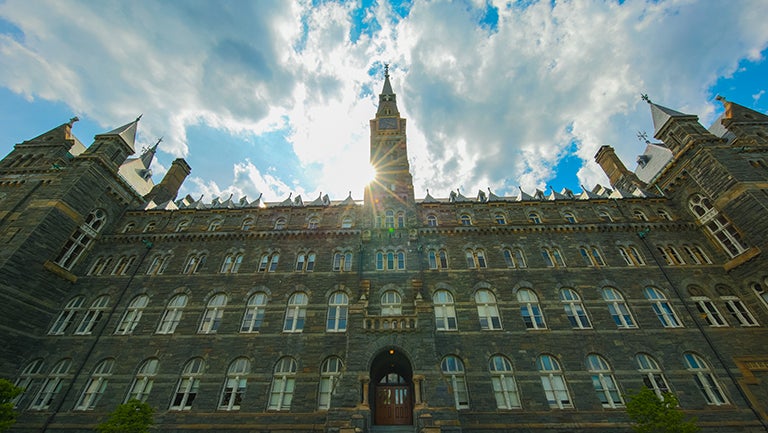Title: Georgetown Advances Workers’ Rights Through New Agreement with Nike and Worker Rights Consortium
Georgetown facilitates a new protocol between Nike, Inc., and the Worker Rights Consortium (WRC), expected to promote the well-being and rights of workers who produce Georgetown-licensed apparel.

Georgetown University has facilitated the establishment of a new protocol between Nike, Inc., and the Worker Rights Consortium (WRC) that will provide the WRC with access to Nike supplier factories that manufacture collegiate products to investigate working conditions.
The protocol also will strengthen coordination between Nike and the WRC regarding any remediation efforts that result from such investigations. It is part of a new retail license agreement between Georgetown and Nike that reflects a shared commitment to improving working conditions in the collegiate apparel industry.
The WRC, launched in 2000 with Georgetown as a founding affiliate, assists universities in enforcing their labor rights codes of conduct and protecting the rights of workers producing apparel and other goods bearing university names and logos.
Power of Engagement
“This new protocol reflects a process of sustained and principled engagement, allowing us to ensure that the safety, welfare, and rights of workers are protected and strengthened in meaningful ways,” says Georgetown University President John J. DeGioia. “It represents the development of an important new framework for collaboration to protect workers’ rights around the world.”
Georgetown allowed its license agreement with Nike to expire at the end of last year because the two organizations were not able to reach agreement on provisions relating to labor standards and factory investigations.
Throughout spring 2017, Georgetown led an engagement process to determine how the university could best play a leadership role in promoting workers’ rights in the collegiate apparel industry.
Ensuring Access
During this time Georgetown consulted with its Licensing Oversight Committee(LOC), which makes recommendations to the university about its trademark licensing policies and includes appointed representatives from the faculty, student body and administration.
The university also engaged faculty and student leaders, experts on workers’ rights and welfare in the global apparel industry and representatives from other universities.
Beginning in June of this year, Georgetown worked closely with Nike and the WRC to develop the protocol for factory investigations and agree upon a new license contract that ensures access for the WRC and upholds the principles of the Code of Conduct for Georgetown University Licensees.
Upholding Principles
“This agreement upholds Georgetown’s principles and promotes the well-being and rights of workers who produce university-licensed apparel,” says J. Callahan Watson, assistant vice president for public affairs and business policy, and chair of the university’s LOC.
“As part of the new license contract, Nike has agreed that its manufacturers will abide by IMG College Licensing’s (IMGCL) Labor Code Standards, which are aligned with Georgetown’s code and include the labor standards under which the WRC investigates factories,” Watson says.
IMGCL is Georgetown’s trademark licensing agent and enters into retail license agreements on behalf of the university.
Georgetown and Nike also have agreed on additional measures to enhance the well-being of factory workers, including a continued commitment to supply chain transparency.
Shared Belief
“Georgetown believes that engagement and collaboration between universities, brands, the WRC and other stakeholders in the collegiate apparel industry is the most effective way to raise standards for workers around the world,” Watson says.
Georgetown has worked with Nike on and off the playing field for more than 35 years.
“Our relationship with Georgetown dates back to the 1970s,” notes Eric Sprunk, chief operating officer for Nike, Inc. “We’ve always found common ground through our respect for each other and never losing sight of our commitment to workers. We will continue to evolve with our university partners under the shared goal of always putting the protection of workers front and center.”
WRC Executive Director Scott Nova says that “binding labor rights agreements between universities and apparel brands have meant concrete improvements in the lives of hundreds of thousands of garment workers.”
“The protocol forged by Georgetown, Nike and the WRC will advance these vital efforts,” Nova adds.
Ongoing Commitment
The new protocol is in keeping with Georgetown’s ongoing commitment to workers’ rights.
For example, university professors John Kline and Ed Soule, both members of the LOC, have conducted research on the Alta Gracia factory in the Dominican Republicthat pays its workers a living wage more than three times the legal minimum and maintains excellent health and safety standards verified by the WRC.
Kline has just co-authored a new book with Sarah Adler-Milstein, a worker-rights advocate and former WRC field director for Latin America and the Caribbean, on the Alta Gracia factory and the apparel industry.
Sewing Hope: How One Factory Challenges the Apparel Industry’s Sweatshops(University of California Press, 2017) will be published Oct. 3.
And for the past four years, Georgetown’s New Student Orientation has ordered its welcome T-shirts from Alta Gracia for all new students on campus.
“This agreement is a tangible manifestation of Georgetown’s longstanding commitment to the welfare of factory workers,” Soule says. “It is easily the most important development in the fourteen years I have served on the university’s Licensing Oversight Committee. The leaders of Georgetown, Nike, and the WRC are to be complimented for completing what I hope will become an industry standard.”